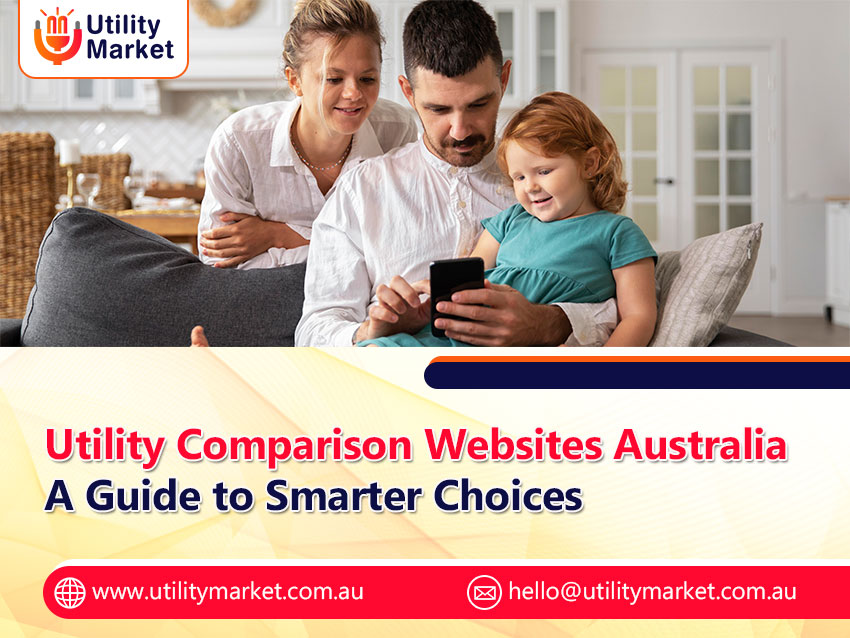
Utility Comparison Websites Australia – A Guide to Smarter Choices
Published September 9, 2025
In today’s fast changing world, organizing the household expenditures efficiently is more important than ever. One of the most effective ways of gaining this is by taking the help of utility comparison websites Australia. The platforms allow Australians compare services across several sectors, ensuring they get the best value for money.
Why using Utility Comparison Website is Preferred?
Comparing Health insurance, gas, electricity, solar & NBN plans made easy. Making good use of such platforms, consumers can:
- Compare prices PAN Australia: Get access to a widest range of options to find the most cost –efficient plans.
- Save good deal of time & effort: Steer clear the need to visit multiple websites followed by making numerous phone calls.
- Making Informed decisions: Gaining insights into features & benefits of varied plans to choose the one that best suits the needs.
Health Insurance Comparison website
Health Insurance is a vital expense for many Australians. As of late 2025, the average monthly premium for a single individual’s cover ranges from $85 to over $280, based on the tier. For hospital & Extras policies, the average monthly cost for a single individual can be $267 to over $350, depending on age & level of cover.
Benefits of Health Insurance Plan Comparison
Using a health insurance comparison website lets you to:
- Compare policies from multiple insurers: Get access to a wide range of options from multiple health insurers.
- Find the best value plans: Make it a point to identify policies that offer the coverage needed at a price you can afford.
- Understanding policy details: Gain transparency on waiting periods, exclusions & co-payments associated with different insurers.
Energy Comparison Website Australia
Energy bills are important part of household expenses. As of 2025, the monthly electricity bill in Australia depends suggestively by state, highlighting the differences in usage, climate and pricing regulations.
Victoria: Approximately $129 – $160 per month
New South Wales: Approximately $164- $229 per month
Queensland: Approx $179 per month
Western Australia: Approx $185 per month
South Australia: Approx $192 per month
How Energy Comparison Websites Help
These platforms make it easier for you to:
- Compare Electricity plans: Review and evaluate different plans to identify the most cost-effective option for your household or business.
- Discover competitive providers: Find energy companies that offer the best rates and deals available in your area.
- Explore dual-fuel deals: Bundle your gas and electricity services together to enjoy extra convenience and potential savings.
Gas & solar comparison website Australia
Gas is the most essential utility service. As per the data from late 2024 and 2025, the average quarterly gas bill in Australia was:
Victoria: $277
New South Wales: $245
Queensland: $176
Western Australia: $144
Such figures are based on proper research and vary mostly based on setting, usage habits & household size.
Benefits of using Gas Comparison Website
By using the platforms, you can:
- Compare Gas Rates: Finding various gas plans to find the most economical choice.
- Bundle Services: Combine gas and electricity services for potential discounts.
- Get rid of hidden fees: Ensure transparency in pricing to prevent unexpected charges.
Solar Comparison Website Australia
Solar energy is a significant choice for Australians planning to reduce their energy costs and carbon footprint. The average cost as of 2025 for a comprehensive installed 10kw solar system is approx. $10,000 to $12,000. The final price based on the quality of components, installation complexity & government rebates.
Why Compare Solar Systems?
Making good use of solar comparison website lets you to:
- Evaluate multiple solar providers: Make it a point to compare offerings from varied installers to find the best possible deal.
- Finding system size & costs: Find out the appropriate system size for your budget & energy needs.
- Knowing the Rebates & incentives: Stay updated about the government scheme such as the small-scale-renewable energy scheme to lower the installation costs.
Making the Best Use Of Utility Comparison Websites
To maximize the benefits of utility comparison websites Australia:
Select service you wish to compare: Choose from energy, gas, health insurance, solar or NBN
- Enter your location: Some plans vary based on your postcode or state.
- Evaluate & compare: Make sure you find out different plans and evaluate to find out the best fit for your needs.
- Choose confidently: Make sure you follow the platform’s guidance to switch providers smoothly.
Conclusion
Management of household expenses is undoubtedly a significant aspect of financial well-being. Australians get the freedom of making informed decisions about the necessary services, guaranteeing they gain the best value for money. Be it energy, gas, solar or health insurance, comparing such options in 2025 can lead to big savings and better service.
Stay updated with Utility Market on LinkedIn
Frequently Asked Questions
Utility Market is an Australian-centric website that makes in-depth comparisons of health insurance, energy, gas, solar, and NBN services. It makes available current details to assist consumers in making wise choices.
Yes, Utility Market consolidates the data of leading providers within every category to provide you with an all-encompassing snapshot of deals available within your region.
Yes. The comparison functionality on Utility Market is free to use, and you can compare services at no expense.
Utility Market updates its information on a regular basis to include current prices, offers, and policy information in order to maintain accuracy.
Yes, Utility Market offers links and instructions on how to change providers without losing service.
Yes, Utility Market enables you to compare health insurance, energy, gas, solar, and NBN services from one platform.
Prioritize the needs and budget of your household. Utility Market brings you cleaner comparisons to help in choosing the ideal plan for utilities.




